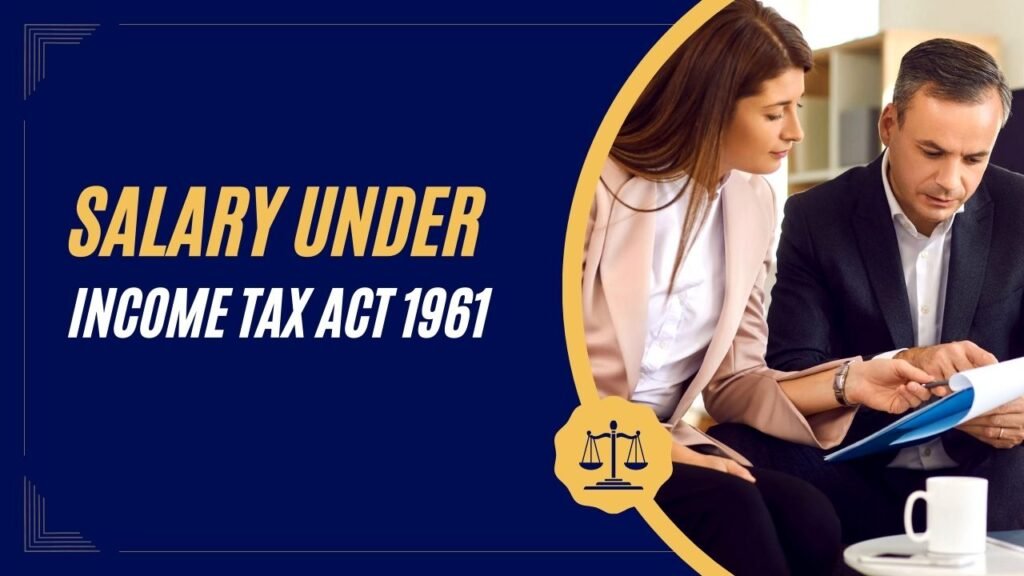The concept of Salary Under Income Tax Act 1961 is crucial for both employers and employees in India. Understanding how salary is taxed and what components are included can help individuals manage their finances better and ensure compliance with tax regulations. This comprehensive guide will delve into the intricacies of salary taxation under the Income Tax Act 1961, covering various components, exemptions, deductions, and more.
Definition of Salary
Under Section 17(1) of the Income Tax Act 1961, salary encompasses a wide range of payments made by an employer to an employee. It includes not only basic salary but also allowances, perquisites, and profits in lieu of salary. Here’s a breakdown of what constitutes salary:
- Basic Salary: The fixed component of an employee’s compensation, usually determined based on their role and experience.
- Allowances: Additional payments made to employees to cover specific expenses, such as house rent allowance (HRA), travel allowance, and medical allowance.
- Perquisites: Benefits or amenities provided by the employer, such as a company car, accommodation, and other fringe benefits.
- Profits in Lieu of Salary: Any payments received instead of salary, such as compensation for loss of employment or voluntary retirement benefits.
Components of Salary
The salary structure can include various components, each with its tax implications. Understanding these components can help employees optimize their tax liabilities:
- Basic Salary: The foundational part of an employee’s pay, fully taxable.
- House Rent Allowance (HRA): Provided to employees living in rented accommodation. It can be partially exempt from tax under certain conditions.
- Special Allowance: Covers various expenses and is fully taxable unless specifically exempt.
- Leave Travel Allowance (LTA): Covers travel expenses for employees on leave. It is exempt from tax subject to specific conditions.
- Bonus: Additional compensation based on performance or company profits, fully taxable.
- Overtime Pay: Extra pay for working beyond regular hours, fully taxable.
- Gratuity: Paid to employees upon retirement or resignation, with certain tax exemptions.
Exemptions and Deductions
The Income Tax Act 1961 provides various exemptions and deductions that can help reduce the taxable salary. Here are some key exemptions and deductions:
House Rent Allowance (HRA) Exemption
HRA is exempt under Section 10(13A) of the Income Tax Act 1961, subject to certain conditions:
- Actual HRA received
- 50% of salary for employees living in metro cities or 40% for non-metro cities
- Actual rent paid minus 10% of salary
The least of the above three amounts is exempt from tax.
Leave Travel Allowance (LTA) Exemption
LTA can be claimed as an exemption under Section 10(5) of the Income Tax Act 1961. The exemption is available for travel expenses incurred within India, subject to certain conditions and limitations.
Standard Deduction
As of the latest tax reforms, a standard deduction of ₹50,000 is available to all salaried individuals. This deduction replaces earlier exemptions such as transport allowance and medical reimbursement.
Professional Tax
Professional tax paid by the employee is allowed as a deduction from the gross salary.
Perquisites and Their Taxation
Perquisites are benefits provided by the employer in addition to salary. Some common perquisites and their tax treatments are:
- Accommodation: The value of rent-free or concessional accommodation provided by the employer is taxable.
- Company Car: The use of a company-provided car for personal purposes is taxable as a perquisite.
- Stock Options: Employee Stock Option Plans (ESOPs) are taxed at the time of exercise, based on the difference between the market value and the exercise price.
Tax Planning for Salaried Individuals
Effective tax planning can help salaried individuals minimize their tax liabilities. Here are some strategies:
Investing in Tax-Saving Instruments
Investing in instruments such as Public Provident Fund (PPF), National Savings Certificate (NSC), and Equity-Linked Saving Scheme (ELSS) can provide tax deductions under Section 80C of the Income Tax Act 1961.
Utilizing Section 80D
Premiums paid for health insurance policies for self, spouse, children, and parents are eligible for deduction under Section 80D.
Home Loan Deductions
Interest on home loans is deductible under Section 24(b), and principal repayment is deductible under Section 80C.
Recent Amendments and Updates
Keeping up-to-date with recent amendments and updates in the Income Tax Act is essential for effective tax planning. Some recent changes include:
- Introduction of New Tax Regime: A new tax regime with reduced tax rates but without most exemptions and deductions was introduced. Taxpayers can choose between the old and new regimes.
- Changes in Standard Deduction: The standard deduction limit has been increased to ₹50,000.
Filing Salary Income
Filing income tax returns accurately is crucial for compliance and to avoid penalties. Here are some steps to file salary income:
- Collect Form 16: Issued by the employer, Form 16 provides details of salary earned and TDS deducted.
- Use the Correct ITR Form: Salaried individuals usually file ITR-1 or ITR-2, depending on their income sources.
- Declare All Income: Ensure all income, including salary, interest, and other sources, is declared.
- Claim Deductions: Ensure all eligible deductions and exemptions are claimed.
- Verify and Submit: After filling in the details, verify the return using Aadhaar OTP or other methods and submit it online.
Common Mistakes to Avoid
Avoiding common mistakes can ensure smooth tax filing and compliance:
- Incorrect Form: Using the wrong ITR form can lead to rejection.
- Non-Declaration of Income: All sources of income must be declared.
- Missing Deductions: Ensure all eligible deductions are claimed.
- Incorrect Bank Details: Ensure bank details for refunds are accurate.
Conclusion
Understanding the taxation of salary under the Income Tax Act 1961 is essential for effective financial planning and compliance. By knowing the various components of salary, exemptions, deductions, and tax planning strategies, salaried individuals can optimize their tax liabilities and ensure a smoother tax filing process. Staying updated with recent amendments and avoiding common mistakes can further enhance the experience of managing salary income tax.
Also Read
- Section 271DA of the Income Tax ActThe Income Tax Act in India is a set of laws that guide how taxes are collected and managed in the country. One important part of this law is Section 271DA of the Income Tax Act, which deals with cash…
- 194E of Income Tax Act: A Comprehensive GuideThe Indian Income Tax Act, 1961, is a law that outlines how taxes should be handled in India. Within this law, there is Section 194E, which specifically deals with how taxes should be deducted on payments made to non-resident sportsmen…
- 194F of Income Tax Act: A Detailed OverviewThe Income Tax Act of 1961 is a comprehensive statute that governs the taxation of income in India. Within this act, various sections deal with specific aspects of taxation, including the obligations of taxpayers, tax rates, and deductions. Section 194F…
- Section 10 23C iiiad of Income Tax ActTax laws in India have special provisions that allow certain institutions to avoid paying taxes. Section 10 23C iiiad of the Income Tax Act is one such provision, specifically aimed at helping smaller educational institutions. It allows them to be…
- Section 10 23C iv of the Income Tax Act: A Detailed ExplanationSection 10 23C iv of the Income Tax Act, 1961, is a part of the Indian tax law that offers tax exemptions to certain organizations. This section is particularly important for institutions that work for the public good, such as…
Frequently Asked Questions
What is considered salary under the Income Tax Act 1961?
Salary under the Income Tax Act 1961 includes basic pay, allowances, perquisites, and profits in lieu of salary. It encompasses various components such as House Rent Allowance (HRA), Leave Travel Allowance (LTA), bonuses, gratuities, and special allowances. All these components together make up the total salary on which income tax is calculated. Understanding these components helps in effective tax planning and compliance with tax regulations.
How is House Rent Allowance (HRA) taxed?
HRA is partially exempt from tax under Section 10(13A) of the Income Tax Act. The exemption is the least of the actual HRA received, 50% of salary (40% for non-metros), or rent paid minus 10% of salary. This helps reduce the taxable income for employees who live in rented accommodation. Proper documentation, such as rent receipts, must be maintained to claim this exemption during tax filing.
What is the standard deduction for salaried individuals?
The standard deduction for salaried individuals is ₹50,000. This deduction replaces the earlier transport allowance and medical reimbursement. It is a flat amount deducted from the gross salary, reducing the taxable income. This simplification helps all salaried taxpayers by providing a straightforward way to lower their tax liability without needing to provide specific expense receipts.
What are perquisites and how are they taxed?
Perquisites are benefits provided by the employer in addition to salary, such as accommodation, a company car, or stock options. These are considered part of the salary and are taxable. The valuation of perquisites depends on the type of benefit. For example, the value of rent-free accommodation depends on the city and employee’s salary, while stock options are taxed at the time of exercise based on the market value.
How can salaried individuals save tax under Section 80C?
Salaried individuals can save tax under Section 80C by investing in tax-saving instruments like Public Provident Fund (PPF), National Savings Certificate (NSC), Equity-Linked Saving Scheme (ELSS), and paying for life insurance premiums. The maximum deduction allowed under Section 80C is ₹1.5 lakh. These investments not only help in reducing the taxable income but also encourage savings and long-term financial planning.
What is Leave Travel Allowance (LTA) and its tax benefits?
Leave Travel Allowance (LTA) is a benefit provided to employees for travel expenses while on leave. Under Section 10(5), LTA can be claimed as an exemption for travel within India. The exemption is available for two journeys in a block of four years. It covers travel expenses for the employee and their family but does not include accommodation or food expenses. Proper documentation of travel expenses is required to claim this exemption.
How are bonuses taxed under the Income Tax Act?
Bonuses received from an employer are fully taxable as part of the salary. They are considered part of the gross salary and do not have any specific exemptions. The bonus amount is added to the total income for the financial year and taxed according to the applicable income tax slab rates. Proper tax planning can help in managing the impact of bonuses on overall tax liability.
What are the recent changes in the Income Tax Act for salaried employees?
Recent changes in the Income Tax Act include the introduction of a new tax regime with reduced tax rates but without most exemptions and deductions. Taxpayers can choose between the old regime, which allows various exemptions and deductions, and the new regime, which offers lower tax rates. Another change is the increase in the standard deduction to ₹50,000, benefiting all salaried individuals.
How can professional tax be deducted from salary income?
Professional tax, a tax levied by state governments on employment, can be deducted from the salary income. The amount paid as professional tax is allowed as a deduction from the gross salary under Section 16(iii) of the Income Tax Act. The maximum amount of professional tax allowed as a deduction is ₹2,500 per year. This helps in reducing the taxable income for salaried individuals.
What is the process for filing salary income tax returns?
To file salary income tax returns, collect Form 16 from the employer, which provides details of salary earned and TDS deducted. Use the correct ITR form (ITR-1 or ITR-2 for salaried individuals), declare all sources of income, claim eligible deductions, and verify the return before submitting it online. Proper documentation and timely filing ensure compliance with tax regulations and help avoid penalties.








